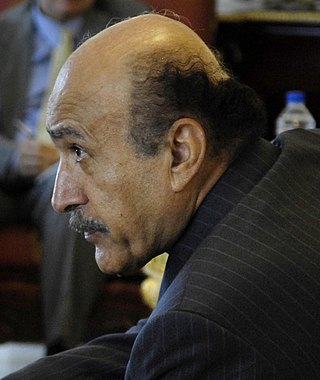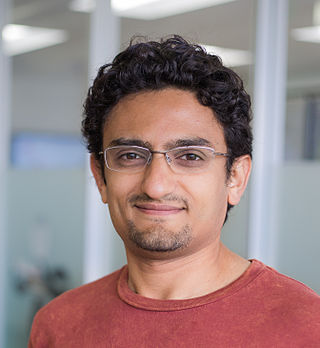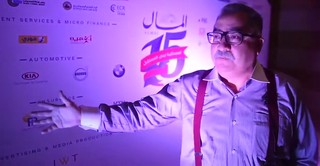Related Research Articles
Yosri Fouda, is an Egyptian investigative reporter, author, and television host. He established Al Jazeera's office in London and was one of the star figures in the channel until he resigned in 2009. Fouda also worked as a television host at the Cairo-based ONTV Egyptian Channel. He co‑authored Masterminds of Terror: The Truth Behind the Most Devastating Attack The World Has Ever Seen, published in 2003 by Arcade Publishing.
Air Marshal Ahmed Mohamed Shafik Zaki is an Egyptian politician and former presidential candidate. He was a senior commander in the Egyptian Air Force and later served as Prime Minister of Egypt from 29 January 2011 to 3 March 2011 under Hosni Mubarak.
Hamdi Qandil was a prominent Egyptian journalist, news anchor, talk show host and activist. Qandil started his journalism career in the 1950s when he wrote for the Akher Sa'a magazine at the invitation of veteran journalist Mustafa Amin. In 1961 he began broadcasting a news show called Aqwal al-Suhuf until 1969 when he was appointed director of the Arab Broadcasting Studios Union. In 1971 he left his post in protest at a government inspection of his technical staff. He later worked with UNESCO from 1974 to 1986, specializing in the field of international media. In 1987 he co-founded a satellite broadcasting company that later became known as MBC, where he worked for three months before leaving because of political differences with its management. Qandil briefly presented the show Ma'a Hamdi Qandil for ART, but left amid disagreements between him and his managers regarding Qandil's planned interviews with Muammar Gaddafi and Tariq Aziz.

Omar Mahmoud Suleiman was an Egyptian army general, politician, diplomat, and intelligence officer. A leading figure in Egypt's intelligence system beginning in 1986, Suleiman was appointed to the long-vacant vice presidency by President Hosni Mubarak on 29 January 2011. On 11 February 2011, Suleiman announced Mubarak's resignation and ceased being vice president; governing power was transferred to the Armed Forces Supreme Council, of which Suleiman was not a member. A new head of intelligence services was appointed by the ruling Supreme Council. Suleiman withdrew from the political scene and did not appear in public after announcing Mubarak's resignation.
Al-Resalah is an Arabic language satellite television channel "to present true Islam".

Al-Dostor (also Al-Dostour and Al-Dustour), is an independent Daily Egyptian opposition newspaper.

Tahrir Square, also known as Martyr Square, is a public town square in downtown Cairo, Egypt. The square has been the location and focus for political demonstrations. The 2011 Egyptian revolution and the resignation of President Hosni Mubarak occurred at the Tahrir Square.
Lamis Elhadidy, is an Egyptian TV presenter. She also worked for Al-Masry Al-Youm newspaper.
Mohamed Said Mahfouz (Arabic: محمد سعيد محفوظ is an Egyptian writer and filmmaker who has worked for the BBC since 2006. He was the presenter and scriptwriter of the widely popular, daring show 'Maqass El-Raqeeb' on Abu Dhabi TV, focusing on liberties and human rights in the Arab world. He produced a number of independent documentaries and won several awards, of which the last was from Al Jazeera International Documentary festival in April 2009. He has been in the UK since March 2006 where he obtained his Master of Arts in Documentary from Royal Holloway University. Currently, he is pursuing his Ph.D at the same university in New Media and Filmmaking.
Belal Fadl is an Egyptian screenplay writer, journalist and a column writer. He was born and raised in Cairo, Egypt, but has Alexandrian roots. Fadl graduated from Cairo University's Faculty of Mass Communication with excellent grades and honours. He began his career as a journalist at Rose al-Yūsuf then became a co-founder and secretary at Al-Dustour, before eventually joining Al-Masry Al-Youm to write his column Istibaha and becoming one of the most important columnists in Egypt.

Rima Maktabi is a Lebanese TV presenter and award-winning journalist who returned to al-Arabiya after hosting CNN's monthly program Inside the Middle East for two years and previously working at the Arab satellite channel since 2005. She was among several female Arab journalists who first became known through her reporting during the 2006 Lebanon War and who had successful careers afterward, including Maktabi and her former colleague at al-Arabiya Najwa Qassem.

Wael Ghonim is an Internet activist and computer engineer with an interest in social entrepreneurship.

Dream TV is an Arabic satellite television channel headquartered in Media Production City, Egypt. Dream TV was the first Egyptian private television channel, and offered two channels on Nilesat: Dream 1 and Dream 2, until 2015. The network provides cultural programming, news analysis, and a platform for talk shows - most notably "10:00 pm" with Mona el-Shazly on Dream 2.

ON, also known as ON E and formerly known as ON TV, is an Egyptian digital television channel owned by the United Media Services (UMS), a company owned by the Egyptian General Intelligence Service (GIS) since 2016. The station positions itself on its website as "the only politically independent Egyptian television station."

Ibrahim Eissa is an Egyptian journalist and TV personality best known for co-founding the popular Egyptian weekly Al-Dustour. He is currently editor-in-chief of Al Tahrir, which he co-founded in July 2011.
Reem Maged is an Egyptian journalist and former host of the popular Baladna bel Masry talk show on Egyptian ONTV. Maged's popularity and renown have dramatically increased due to her critical coverage of political events since the 2011 Egyptian revolution, as well as her hosting of individuals on her show that are critical of the military Supreme Council of the Armed Forces, or SCAF, that has ruled Egypt since the resignation of Hosni Mubarak. She has been described as "Egypt’s best and arguably most vocal [female voice] in delivering the true happenings to the country on a nightly basis." Maged stopped presenting the show in 2013 and in 2014 joined a hunger strike campaign in solidarity with political prisoners.

The following chronological summary of major events took place during the 2011 Egyptian revolution right up to Hosni Mubarak's resignation as the fourth President of Egypt on 11 February 2011.

El-Nas is an Egyptian television station founded in January 2006 and broadcast from Cairo until the 2013 Egyptian coup d'état.
Al Tahrir was a privately owned classical Arabic 18-page daily published in Cairo, Egypt. It was named after the Tahrir Square in Cairo which witnessed demonstrations in the 2011 protests. The daily was the second publication launched after "the revolution". The paper's print edition was closed in September 2015, and it became an online-publication. It ceased publication in August 2019.
Abdel Halim Al Masoudi, he is known as Al Zoghlami, was born on July 1, 1965, in Jérissa, which is located in the Tunisian province of El Kef. He is a writer, theater critic, university professor and producer of television cultural programmes.
References
- 1 2 El-Hennawy, Noha. "Al-Tahrir newspaper launches, hoping to be voice of opposition" . Retrieved 11 March 2012.
- 1 2 Arishie, Mohssen. "Egypt Tahrir Inspires New TV Channels". Archived from the original on 31 August 2011. Retrieved 11 March 2012.
- 1 2 "Al Tahrir TV". Archived from the original on 26 March 2012. Retrieved 11 March 2012.
- ↑ "تغيير اسم قناة التحرير إلى ten وانطلاقة جديدة خلال أيام - اليوم السابع". Youm7 . 1 February 2015. Retrieved 16 February 2018.
- 1 2 Solayman, Hanan. "New TV channels hit Egypt's airwaves" . Retrieved 11 March 2012.
- 1 2 3 4 Iskandar, Adel. "Egypt Media Flourish Amid Fears". Huffington Post. Retrieved 11 March 2012.
- 1 2 3 4 5 6 7 8 9 10 Abdel Rahman, Mohammad. "Will Tahrir Channel Leave the Square?". Archived from the original on 3 January 2012. Retrieved 11 March 2012.
- ↑ Raafat, Maryam. "New Egyptian channels galore" . Retrieved 11 March 2012.[ permanent dead link ]
- 1 2 3 Al-Bardeeny, Shaima. "قناة "التحرير" تنهى أزمتها المالية ببيع حصة إبراهيم عيسى لمستثمرين" . Retrieved 9 April 2012.
- ↑ ""التحرير" تنفصل عن "الشباب" بعد بيع "توفيق" حصته لـ"عامر"" . Retrieved 9 April 2012.
- ↑ Abdel-Rady, Samy. "دينا عبد الرحمن: منعوني من الظهور..ومدير البرامج: المذيعة تفتعل المشاكل" . Retrieved 9 April 2012.
- ↑ AbdelRahman, Mohamed. "بلال فضل يغادر قناة التحرير مؤقتا.. ويتفرغ لكتابة حلقات مسلسل الهروب لكريم عبد العزيز". Archived from the original on 2011-12-28. Retrieved 25 April 2012.
- ↑ "عمرو الليثى وبلال فضل ينسحبان من التحرير نهائياً" . Retrieved 25 April 2012.
- 1 2 3 Shaima Al-Bardeeny & Mahasen Al- Sanoosy. ""قنديل" يهدد بترك قناة التحرير خلال 10 أيام إذا لم تلتزم بالسياسة التى نشأت من أجلها" . Retrieved 10 April 2012.
- 1 2 3 Al-Ghitani, Nagwa. "حمدي قنديل يرفض العودة لقناة "التحرير"". Archived from the original on 28 January 2012. Retrieved 10 April 2012.
- ↑ Iskandar, Adel. "A Year in the Life of Egypt's Media: A 2011 Timeline [Updated]" . Retrieved 11 March 2012.
- 1 2 3 "Egypt: After formal blackout, censorship reaches independent media" . Retrieved 11 March 2012.
- 1 2 صالح, محمد. "دعاء سلطان: "التحرير" منعت عرض "توك شوز" .. والقناة ترد: عُطل فني". Archived from the original on 12 March 2012. Retrieved 11 March 2012.
- 1 2 3 شعراوى, إخاء. "دعاء سلطان: التحرير منعت عرض توك شوز.. والقناة : طول الحلقة السبب" . Retrieved 11 March 2012.
- ↑ يوسف, رانيا. "دعاء سلطان تتحدي قناة التحرير وتعرض الحلقة الممنوعة علي يوتيوب". Archived from the original on 2012-02-26. Retrieved 11 March 2012.
- 1 2 3 4 5 6 7 "Egypt: Journalist's TV show taken off the air" . Retrieved 10 April 2012.
- 1 2 El Gundy, Zeinab. "Famous Egyptian TV host sacked after challenging ex-army officer on air" . Retrieved 10 April 2012.
- ↑ El Gundy, Zeinab. "Friday 'Honor' Demo Draws Thousands to Egypt's Tahrir Square" . Retrieved 10 April 2012.
- ↑ "تغيير اسم قناة التحرير إلى ten وانطلاقة جديدة خلال أيام - اليوم السابع". Youm7 . 1 February 2015. Retrieved 16 February 2018.